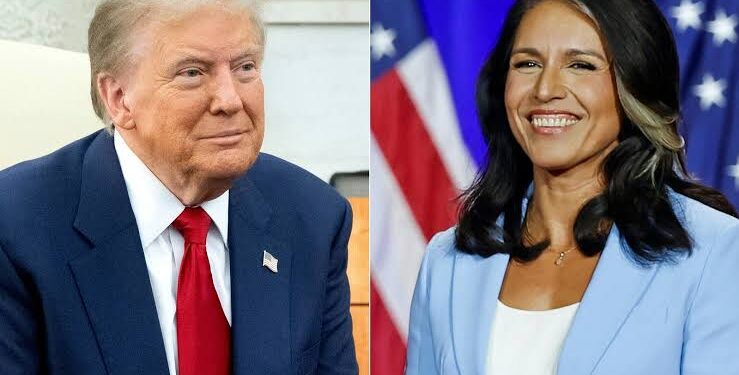United States President-elect Donald Trump has made a controversial choice by appointing Tulsi Gabbard as the Director of National Intelligence (DNI). Gabbard, a former Democratic congresswoman, veteran, and independent political figure, will now oversee one of the most critical roles in the U.S. intelligence community. This decision, announced on November 14, 2024, has sparked debate across party lines due to her controversial foreign policy positions and limited experience in intelligence operations.
Who is Tulsi Gabbard?
Tulsi Gabbard, 43, holds the distinction of being the first Hindu member of the U.S. Congress and the first congressperson born in American Samoa. Raised in Hawaii, she also spent part of her childhood in the Philippines. Gabbard is a veteran of the Iraq war and has been deployed in Kuwait.
She served four terms in the U.S. House of Representatives from 2013 to 2021, representing Hawaii’s second congressional district as a Democrat. Gabbard gained national attention in 2016 when she supported Senator Bernie Sanders in his presidential campaign, and she later ran her own unsuccessful presidential bid in 2020.
In 2022, Gabbard publicly left the Democratic Party, criticizing it as an “elitist cabal of warmongers” and accusing it of promoting “anti-white racism.” She has since aligned herself with more conservative political values, becoming an independent voice in American politics.
Why Is Her Appointment Controversial?
Gabbard’s appointment has raised significant concerns due to her controversial foreign policy positions, particularly her perceived leniency toward adversarial nations such as Russia and Syria. Critics argue that her isolationist stance could hinder the U.S.’s ability to engage in critical global conflicts.
Gabbard has previously expressed controversial views, including support for dialogue with Syrian President Bashar al-Assad and criticisms of U.S. military interventions. These positions have led to bipartisan unease, with some questioning her ability to provide unbiased intelligence analysis.
Representative Elissa Slotkin, a Democrat and member of the Senate Intelligence Committee, expressed reservations, stating that Gabbard’s views “seem to preference adversaries.” Slotkin’s sentiment is echoed by other lawmakers who worry that Gabbard’s leadership could politicize intelligence operations.
Responses from Lawmakers
Reactions to Gabbard’s nomination have been divided. While some Republican senators, such as Markwayne Mullin, have expressed confidence in her abilities, others, including James Lankford, have called for a thorough review of her past statements and policy positions.
Republican Senator Eric Schmitt dismissed accusations that Gabbard is “compromised,” calling such claims “insulting” and unfounded. Schmitt and others have urged critics to engage with Gabbard directly before drawing conclusions.
Nevertheless, questions remain about how Gabbard’s leadership might affect the independence of intelligence agencies, particularly regarding information relayed to the president.
The Bigger Picture: Intelligence and Politics
As director of national intelligence, Gabbard will oversee 18 intelligence agencies, including the CIA and NSA, and coordinate their efforts to protect U.S. national security. Critics worry that her appointment could lead to increased executive control over intelligence agencies, potentially compromising their independence.
Supporters argue that Gabbard’s military background and independent political stance may bring fresh perspectives to the role. However, her critics believe her lack of intelligence experience could hinder her ability to manage complex agency operations effectively.
What’s Next for U.S. Intelligence Under Gabbard?
Gabbard’s nomination awaits Senate confirmation, a process that is likely to involve rigorous questioning about her foreign policy stances, past statements, and leadership abilities. As the U.S. faces growing challenges on the global stage, her leadership could reshape the nation’s intelligence priorities.
Will Tulsi Gabbard’s appointment mark a shift in U.S. intelligence operations or deepen political divisions in national security?
Related Stories:
Trump picks former WWE CEO and TV’s Dr Oz for top roles
Latest Administration Picks by Trump, New Inner Circle
Who Is John Ratcliffe, New CIA Director Appointed by Trump?
Bomb threats made against Trump cabinet nominees
















